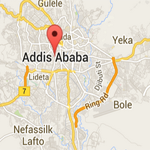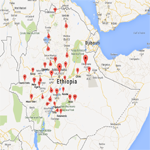1. Bond

What is Bond?
Bond is a debt instrument issued for a period of more than one year with the purpose of raising capital by borrowing. . It is a debt security, under which the issuer owes the holders a debt and, depending on the terms of the bond, is obliged to pay them interest (the coupon) and/or to repay the principal at a later date, termed the maturity. Interest is usually payable at fixed intervals (semiannual, annual, sometimes monthly).
Savings Bond
Savings bond is an alternative type of saving or a debt instrument issued by the government. A savings bond is basically a more restrictive (longer maturity period) type of savings account. Savings bonds are considered one of the safest types of savings schemes because they are backed by the full faith the government. The big advantage of a savings bond is that the rates of interest you can expect to earn are generally higher, as you need to be able to commit your savings for a set period.
2. Characteristics of the Grand Ethiopian Renaissance Dam Bond
- It is a bond which enjoys full government Guarantee.
- It is a bond marketed to finance the Grand Ethiopian Renaissance Dam which the government intends to build on Abay River.
3. Bond Types

- Interest bearing Bond
- Non- interest bearing Bond
3.1 The bond can only be sold to Ethiopian Nationals and foreign nationals of Ethiopian Origin.
3.2 Interest accrued will be paid every six months.
4. Benefits of the Bond
4.1 Revenue accrued will be free from any tax.
4.2 It can be used as collateral to get loans from banks.
4.3 For the client it will earn revenue
4.4 Since it has full government Guarantee it is risk free.
4.5 It earns better interest than the normal savings rate.
4.6 It can be transferred as an inheritance or to a third party.
5. Bond Value
5.1 The minimum Bond value is 50 in Birr. Bond values of 25 (for denomination only), 50, 100, 300, 400, 500,600,700,800,900, 1000, 2000, 3000, 4000, 5000, 10,000 and 50,000, 100,000, 200,000, 500,000 and 1,000,000 could be purchased. There is no limit on the maximum amount one wants to buy.
6. To purchase a bond the following needs to be fulfilled
6.1 For those 18 and older: - Kebele or Work ID
6.2 For children: Birth Certificate
6.3 For Student: School or Keble ID
7. Bond -Maturity Date and Interest Rate
7.1 Interest Rate
The interest rate is paid based on the following maturity dates:-
- Bonds with Maturity date up to 5 years – 5.5%
- Bonds with maturity date above 5 years--6%
8. How to buy bonds
8.1 Through Development Bank of Ethiopia (DBE) and commissioned agents including Commercial Bank of Ethiopia (CBE) and Regions Micro-Finance institutions.
These banks have branches in many parts of the country which makes it easier to buy bonds.
9. About transferring the bond to a third party
9.1 The Bond can be transferred as a gift or as an inheritance by signing on the back of the coupon, the bond can also be used as a collateral to take loans from banks as well as it can be sold to a third party via secondary market.

10. About buying the bond on behalf of a third party
10.1 It is allowed to by a bond in the name of a third party. However, the name that will appear on the bond will be that of the bearer of the bond. The person that will be buying the bond on behalf of the third party can sign at the back of the coupon, care-of the coupon owner. The principal and interest paid at the time of maturity will only be returned to the owner of the coupon or to the person that is legally representing the bond owner.
10.2 Parents or guardians can buy bonds on behalf of their minor children. This can be done by writing the name of the Child/Children on the coupon and by signing care-of on it. If parents want to keep the interest and principal until the child/ children get the age of 18 this can be considered accordingly.
















